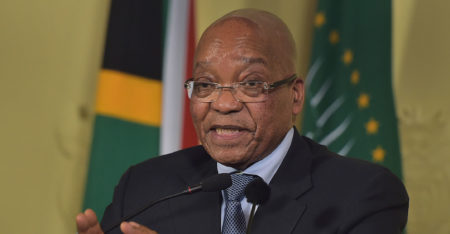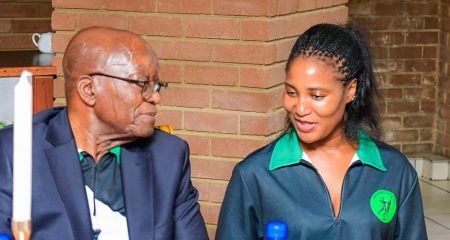
Jacob Zuma blamed a Western plot and opposition collaborators for the bid by officials in the ruling party to oust him as the nation’s president as he refused to resign, saying he won’t hand himself over to his enemies.
The president’s outburst came at a meeting of the ANC’s national executive committee near Pretoria, where officials, including some cabinet ministers, said he must step down, said a person who attended a three-day gathering and asked not to be identified because the party hasn’t commented. The meeting ended late on Monday.
Events at the meeting weren’t supposed to pan out like this. The gathering was to be a regular parley, the last of the year. But as it opened on Saturday, tourism minister Derek Hanekom made an unexpected proposal: Zuma should step down. He was backed by three cabinet ministers, the person said.
Zuma, 74, strongly defended himself, saying he wasn’t responsible for the ANC’s worst electoral performance since the end of apartheid when the party lost control of Pretoria and Johannesburg in local elections in August, according to the person. Party infighting in Gauteng province was to blame.
He went further. Officials in the province were even behind the jeering of him at the memorial service at a stadium in Johannesburg for Nelson Mandela in December 2013, Zuma said, according to the person. They wanted to humiliate him, he said.
The call for his resignation came just three weeks after the main opposition party, the Democratic Alliance, submitted a motion of no-confidence in him in parliament, Zuma said, asking his detractors to deny that they were working with the ANC’s rivals.
Zuma’s seven-year tenure as president has been marred by a succession of scandals and policy missteps that have weighed on the rand and put the nation’s investment-grade credit rating at risk. But he’s never had a contingent of ministers openly demanding that he resign. He’s scheduled to step down as the ANC’s leader in December next year and his second term as national president ends in 2019.
Demands for the former ANC intelligence operative to quit have multiplied as political missteps and a feud with finance minister Pravin Gordhan over the management of state-owned companies and the affordability of building nuclear power plants. Compounding his woes is a constitutional court ruling that he violated his oath of office by refusing to repay taxpayer funds spent on upgrading his private home.
Pressure on the president to resign has mounted since the graft ombudsman released a report on 2 November that implied Zuma may have let members of the Gupta family, who are his friends and in business with his son, influence cabinet appointments, and called for a judicial commission of inquiry to determine whether there had been any wrongdoing. Zuma and the Guptas deny intentionally violating any laws.
By the end of meeting, Zuma had survived. The committee decided that the ANC’s top six office holders will discuss Zuma’s fitness to remain president before a consultative conference next year, two members of the committee who were at the meeting said on condition of anonymity on Monday.
Returning to his regular duties, Zuma is travelling to Cuba this week to attend the funeral of Fidel Castro.
The rand, after gaining almost 3% against the dollar on Monday, fell the most of 31 major and emerging market currencies, declining 1,8% to R13,98 to the dollar as of 12.01pm in Johannesburg.
Zuma’s spokesman, Bongani Ngqulunga, referred queries to the ANC, whose spokesman Zizi Kodwa didn’t immediately answer a call to his mobile phone or reply to a text message. — (c) 2016 Bloomberg LP




